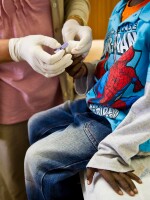By the current blood test for vitamin D, most African-Americans are deficient. That can lead to weak bones. So many doctors prescribe supplement pills to bring their levels up.
But the problem is with the test, not the patients, according to a new study. The vast majority of African-Americans have plenty of the form of vitamin D that counts — the type their cells can readily use.
The research resolves a long-standing paradox.
"The population in the United States with the best bone health happens to be the African-American population," says Dr. Ravi Thadhani, a professor of medicine at Massachusetts General Hospital and lead author of the study. "But almost 80 percent of these individuals are defined as having vitamin D deficiency. This was perplexing."
The origin of this paradox is a fascinating tale of genes interacting with geography. More on that later.
To unravel the mystery, Thadhani and his colleagues looked closely at various forms of vitamin D in the blood of 2,085 Baltimore residents, black and white. They focused on a form of the vitamin called 25-hydroxyvitamin D, which makes up most of the vitamin circulating in the blood. It's the form that the standard test measures.
The 25-hydroxy form is tightly bound to a protein, and as a result, bone cells, immune cells and other tissues that need vitamin D can't take it up. It has to be converted by the kidneys into a form called 1,25-dihydroxyvitamin D.
For Caucasians, blood levels of 25-hydroxyvitamin D are a pretty good proxy for how much of the bioavailable vitamin they have. But not for blacks.
That's because blacks have only a quarter to a third as much of the binding protein, Thadhani says. So the blood test for the 25-hydroxy form is misleading. His study finds that because of those lower levels of the protein, blacks still have enough of the bioavailable vitamin, which explains why their bones look strong even though the usual blood tests say they shouldn't.
"The conclusion from this study is that just because your total levels are low, it doesn't mean we need to replace vitamin D" using supplements, Thadhani says. The study was published Wednesday in the New England Journal of Medicine.
The reason people of African descent have far less protein-bound vitamin D is probably related to the geographic origins of the human race. Our earliest ancestors lived near the equator in Africa, where sunlight was plentiful and intense year-round.
Vitamin D is synthesized in the skin when sunlight strikes it. When sunlight is deficient, the vitamin has to come from dietary sources such as eggs and fish oil.
Humans living in sunny climates make plenty of vitamin D on their own. In fact, one reason for the high degree of skin pigmentation in people of African descent is to prevent the synthesis of too muchvitamin D, which can be toxic.
Early humans didn't need to store up reserves of vitamin D, so they didn't need as much of the binding protein, whose function is to squirrel the vitamin away in a form where it can be used later.
"Everyone who came out of Africa had the ancestral genotype associated with lower vitamin D-binding proteins," Thadhani says. "When humans moved to areas with less sunlight, a different genotype evolved. The further north they went, the more people needed reserves of vitamin D. So D-binding protein levels went up."
And that genetic difference in vitamin D-binding proteins is what researchers have finally figured out.
Dr. Michael Holick, a leading authority on vitamin D at Boston University Medical School, tells Shots that the new research is prompting him to resurrect blood samples from earlier studies to figure out whether the ill effects of low vitamin D in African-Americans and Caucasians are related to low levels of the bioavailable form or the protein-bound form.
While the effect of vitamin D on bone health is undisputed, Holick says, "there's a lot of controversy about [the vitamin's effect on] hypertension, diabetes, cancer and infectious diseases."
Meanwhile Holick, who wrote an editorial in the journal accompanying Thadhani's study, intends to keep giving his African-American patients vitamin D supplements when their blood levels of 25-hydroxyvitamin D are low, even though they may not need the pills to maintain strong bones.
"There's no downside to supplementation, so it's not a big deal," Holick says.
But Thadhani says doctors should hold off on prescribing vitamin D until they do other tests to determine whether their African-American patients are really vitamin D deficient. Those tests include blood levels of calcium, bone density tests and parathyroid hormone levels.
There is currently no approved test for the bioavailable 1,25-dihydroxyvitamin D, although Thadhani and his colleagues are working on one and have filed for a patent.
He says he used to take vitamin D supplements "until I realized there are genetic differences, then I stopped. I've looked at my bioavailable levels of vitamin D. Now I'm comforted to know that I'm not deficient."
Copyright 2020 NPR. To see more, visit https://www.npr.org.



